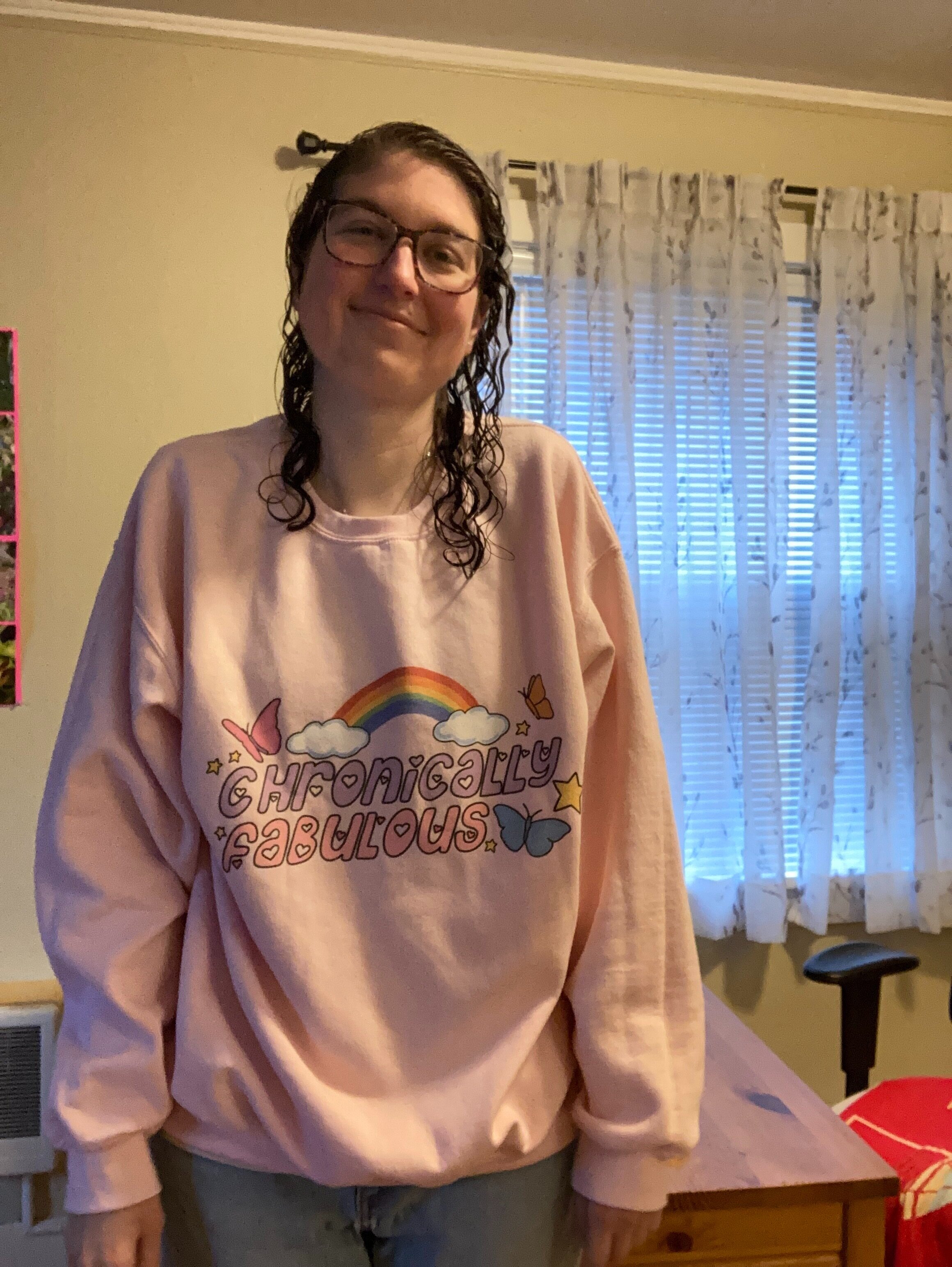Daily Life | IBD | Information

Recently, I sat in the bathtub and really looked at my body for the first time in a while. I thought to myself, “Where did I go?” Sure, I saw a body, right there in front of me, but it wasn’t mine. At least, it didn’t look like mine.
My skin is so thin from all the prednisone I’ve taken that I can now see the small webs of tiny veins I didn’t even know were there before. The steroids have also given me the infamous “moon face,” redistributing weight from my arms and legs to my face so that my limbs look unusually scrawny while my cheeks have grown dramatically in size. Thanks to some Crohn’s related problems with my stomach, even small amounts of food cause immense bloating, making me appear a few months pregnant most of the time.
Simultaneously, my last bone density scan showed bone loss from the steroids, and I seem to keep shrinking despite all the calcium supplements and cans of Ensure. At my last colonoscopy, the doctor told me, “I’m using a pediatric scope on you because you’re so small.” I thought, “Small?” I couldn’t remember ever being described as small before. I was always a tall kid with meat on my bones. “Small?”
I am not here to tell anyone else how to feel about their weight. In a society that places excessive value on thinness and shames fatness, IBD weight changes are fraught with complexity and nuance that could fill multiple academic journals. But, for me, my IBD weight loss will never be a compliment.
The truth is, I am horrified by my weight loss and my dramatic appearance changes. I see myself wasting away before my very eyes, and yet nothing I do stops it. Endless comments from relatives, acquaintances, friends, and even healthcare workers–“Wow! You look great!” or “You’re so lucky you can’t gain weight,” or “It’s ok that you’re too tired to do the exercise you used to love because you don’t even need to exercise!”–fill me with pain and fury.

Photo by Sanibell BV on Unsplash
When someone compliments me on my IBD weight loss, I want to ask them if they’ve ever had to call the ER and ask, “How much blood in my stool is too much to stay home safely?” I want to ask them if they’ve ever clung to the towel rack while on the toilet to keep from passing out. I want to ask them if they’ve ever carried trash bags in their purse in case they throw up on the bus, or kept spare pants and underwear in their desk drawer at work, or had so much rectal pain that they had to ask for a more cushioned chair at school.
I have met so many women with IBD who finally got into remission, only to develop an eating disorder. I’ve heard so many times, “I didn’t realize how much of a problem people had with my body until I lost weight due to IBD, and they started treating me better.” I wonder, “If I ever get to remission, will that happen to me?”
For me, one of the hardest parts has been how ill-prepared the healthcare system is to address appearance-related changes due to IBD. My doctors’ time is so limited, appearance-related side effects hardly seem worth bringing up, especially when there isn’t much they can do about it. As frustrating as the numerous steroid-related appearance changes are for me, prednisone is a lifesaving medication for my adrenal insufficiency as well as my IBD. Surely weight redistribution is hardly worth mentioning when the drug responsible keeps me alive?
But appearance changes due to IBD and medications are about more than vanity and beauty standards. For me, it isn’t about “OMG, my cheeks are so puffy!” or “OMG, I’m so thin!” It’s more about the disorientation that comes with my appearance changing seemingly overnight. It isn’t just “OMG; this isn’t my body!” It’s mourning, on top of all the other losses, a loss of my sense of self.
Whether your IBD has made you gain weight or lose it (or both); whether you have had skin manifestations or hair loss; whether steroids have changed your proportions or destroyed your bones, or rapidly increased your weight; you have likely experienced a sense of loss. A loss of control, a loss of your old self, and a loss of the ability to keep your IBD invisible.
I hesitated to write this blog because I don’t have any of the answers. I don’t know how to feel like yourself again when IBD changes your whole life and your body. I don’t know how to feel at home in my forever changing IBD body. I don’t quite know what to say to people who comment on my appearance changes, other than to ask them not to. I don’t always know how to have compassion for a body that seems bent on destroying itself.
All I can do is cling to aspects of my former self–my love of writing, my favorite books, my precious cat, my favorite music, the people who love me, the beautiful and hilarious memories of my late grandma–and try to embrace my ever-changing IBD self the best I can. And on the days when I feel particularly unmoored, I try to be gentle with this frustrating body of mine and appreciate it for surviving despite everything. I work to muster within myself the compassion and strength to keep adapting, keep connecting, and keep finding pockets of joy to tether me, regardless of what IBD does to me
